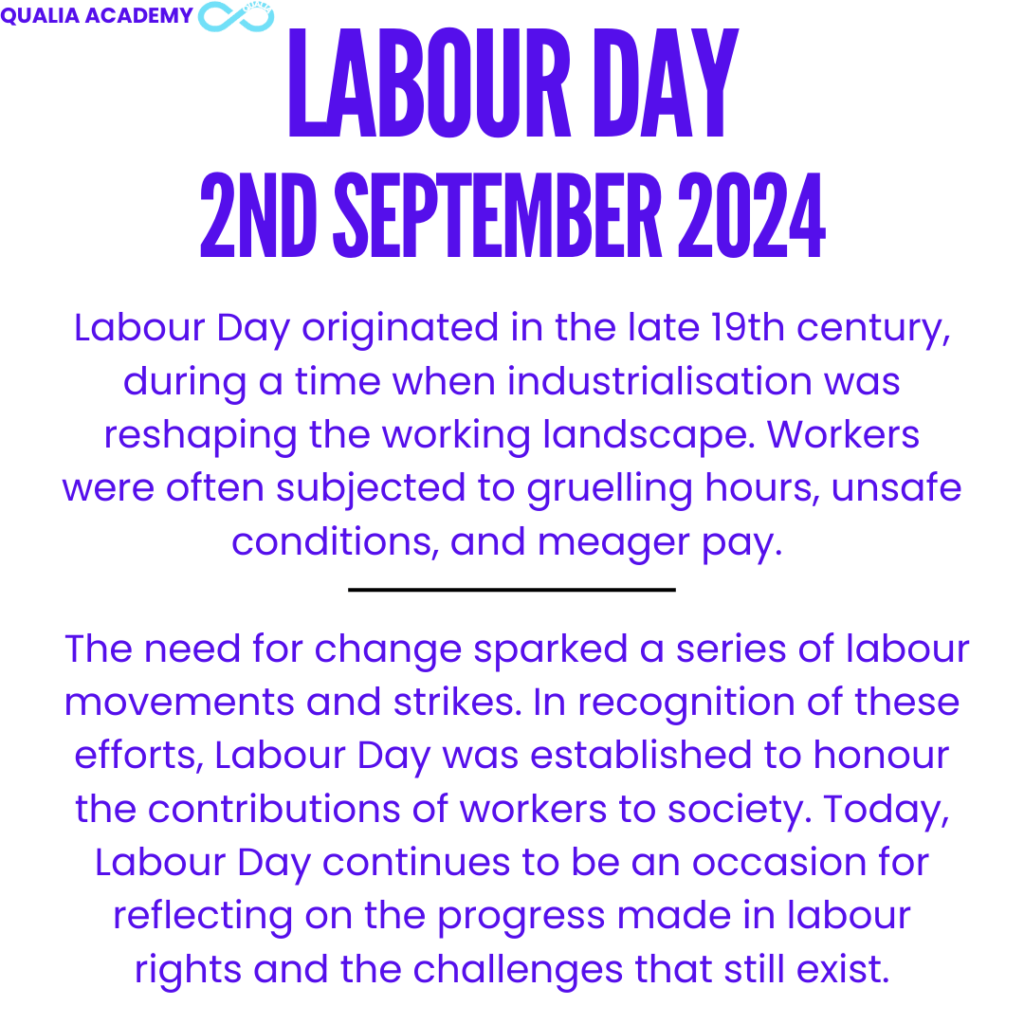
Labour Day, often regarded as a symbolic celebration of the workforce, holds significant meaning across many nations. Observed on the first Monday in September. this day serves as a powerful reminder of the struggles, achievements, and ongoing efforts to improve working conditions for labourers. In this blog, we’ll delve into what this represents, why it remains crucial today, and how the nature of labour has evolved over the years.
What is Labour Day?
Labour Day originated in the late 19th century, during a time when industrialisation was reshaping the working landscape. Workers were often subjected to gruelling hours, unsafe conditions, and meager pay. The need for change sparked a series of labour movements and strikes. In recognition of these efforts, this day was established to honour the contributions of workers to society. It became a day of rest and celebration, but more importantly, it symbolised the broader struggle for workers’ rights. Today continues to be an occasion for reflecting on the progress made in labour rights and the challenges that still exist.
Why is Labour Day Important?
This day that underscores the importance of workers and their rights. It serves as a reminder of the sacrifices made by earlier generations to secure the benefits many enjoy today, such as the eight-hour workday, weekends, minimum wage, and health and safety regulations.
Moreover, this highlights the ongoing importance of advocating for workers’ rights. While many countries have established labour laws, issues such as wage disparity, workplace discrimination, and the gig economy’s precarious nature remind us that the fight for fair labour practices is far from over. As automation and technology reshape the workforce, this day also prompts discussions about the future of work and the need for policies that protect workers in an evolving economic landscape.
How Has Labour Changed Over the Years?
The nature of labour has undergone significant transformations over the past century. Understanding these changes is crucial to appreciating the current state of workers’ rights and the challenges that lie ahead.
Industrial Revolution and Early Labour Movements
The Industrial Revolution marked the beginning of modern labour as we know it. The shift from agrarian economies to industrialised cities led to the rise of factories, where workers faced long hours, low wages, and dangerous conditions. This era gave birth to the first labour movements, as workers began to organise and demand better treatment.
The late 19th and early 20th centuries saw the rise of unions, which played a pivotal role in negotiating for workers’ rights. Strikes, protests, and collective bargaining became common tools for securing improvements in wages, hours, and safety.
Post-War Economic Boom and the Rise of the Middle Class
Following World War II, many Western nations experienced economic booms that significantly improved the standard of living for workers. Union membership peaked, and the concept of the middle class was solidified. Workers enjoyed better wages, benefits, and job security, leading to an era of prosperity and the expansion of the consumer economy.
However, this period also saw the beginning of deindustrialisation in some regions, as companies began outsourcing jobs to countries with cheaper labour costs. This shift would have lasting impacts on the global workforce.
The Rise of the Gig Economy and Remote Work
In recent decades, the nature of work has shifted once again with the advent of the gig economy and the rise of remote work. Technology has enabled new forms of employment, such as freelancing and contract work, which offer flexibility but often lack the protections and benefits associated with traditional employment.
Ways to Participate
Labour Day is an opportunity to celebrate workers’ contributions and advocate for continued improvements in labour rights. Here are some meaningful ways people can observe and participate in this:
Attend or Participate in Local Events
Many communities host Labour Day parades, festivals, and rallies. These events often feature speeches from labour leaders, performances by local artists, and activities that celebrate workers. Participating in these events not only honours workers but also provides a platform to discuss current labour issues and solutions.
Support Workers’ Causes
Use this day as a chance to support workers’ rights. This can include:
Joining or donating to labour organisations: Support groups that advocate for fair wages, better working conditions, and workers’ rights.
Participating in petitions or campaigns: Engage in campaigns that promote fair labour practices, equality, and safe working environments.
Learn and Educate
This day is an ideal time to educate yourself and others about the history of labour movements and the ongoing challenges workers face. Consider:
Reading books or articles: Explore literature on the history of labour rights and current issues in the workforce.
Attending workshops or seminars: Look for educational events that focus on labour rights and workplace safety.
Support Local Businesses
Many local businesses and workers benefit from increased patronage during holidays. Support small businesses and local artisans to help boost their visibility and success. This can also include choosing to shop at stores that have fair labour practices and ethical supply chains.
Volunteer Your Time
Offer your time to causes or organisations that support workers. Volunteering can range from helping at a local food bank to participating in community outreach programs that focus on worker support and education.
Advocate for Policy Change
This day can serve as a catalyst for advocating for policy changes that benefit workers. This might involve:
Contacting elected officials: Express support for legislation that improves working conditions and worker protections.
Participating in local government meetings: Engage in discussions about labour policies and community needs.
Share on Social Media
Use social media platforms to raise awareness about this day and its significance. Share posts, infographics, and articles that highlight workers’ achievements and advocate for labour rights. Engaging in conversations online can help spread the message and encourage others to participate in meaningful ways.









